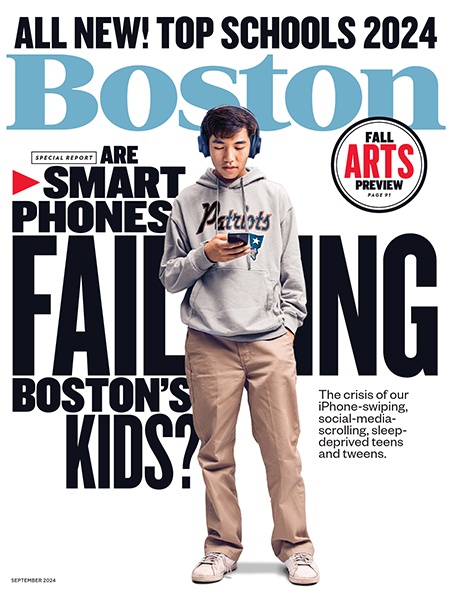Do You Give a Seventh Grader a Smartphone?
Two mothers in Greater Boston share their differing views.

As part of our Top Schools 2024 special report about kids and cell phones, we’ve asked two mothers of seventh graders to share their perspectives on why they have—or haven’t—given their child a smartphone.
Why I won’t give my seventh grader a smartphone…
“What scares me most is observing my own behavior with the phone. I’m addicted to Facebook. It has radically altered my life. I used to read copious amounts of books and magazines, and I don’t read them anymore. I see how it affects my relationships. It’s really negatively affected my life.
My daughter is a rising seventh grader. We got her a flip phone at 12 because I don’t want her to not be able to text with people. She has an iPad. She can use Messenger Kids with people. But I have all kinds of rules: If there are friends over, you can’t be on a screen. This was always my rule, but it’s really unraveling now that so many kids have phones.
She gets plenty of screen time. She watches tons of TV; she has time on the iPad. But the amount that she gets, given our restrictions, is just a fraction of what other people are contending with. Her anxiety is less than other kids. She has some, which I think is age-appropriate and seems universal for her generation. But we’ve witnessed her being able to do things that are kind of unusual in this age group: to just meet people.
We have signed a Wait Until 8th pledge. I’m not purporting to be an expert, but I am reading the studies. I just really want to raise a resilient, independent child who can solve problems, who can think analytically, with unsupervised play outside, interacting with the world and with other people. Not a week after we got her the flip phone, she got a message: ‘Hi; how are you?’ She wrote back, ‘Who’s this?’ thinking it’s some friend, because she doesn’t have enough names and numbers in her new phone. There was chatting back and forth. This was at 9 p.m.
I get those messages, and I delete them. But a child doesn’t know what to do with that. We’ve discussed it with her, but she was so excited to get a message from a friend that she got up and responded. The next thing you know, this guy was calling 11 times in a row. It was a grown man.
Still, we don’t want to prevent our daughter from socializing. My kid is highly socially skilled, enormously emotionally intelligent, and will have friends even if she’s the only one on the planet without a cell phone. I have total confidence in her with that. Even now, she keeps forgetting her flip phone. She’s not addicted to it. To be fair, we don’t suffer in the same way.” —Rachel Canar, Arlington

Why I gave my seventh grader a smartphone…
“My son got his first iPad at four, passed down to him by a friend of ours who worked at Apple when my daughter was born so that he could sit beside me and play games, so he’s very tech-savvy. We started with a two-hour limit per day, and when the time was up, it was up. Then, depending on if it was weekends, holidays, or COVID, limitations slowly went out the door.
We got him a phone for his 13th birthday, in 7th grade, because he was starting to be farther away from us, getting dropped off on a sports field. Just last night, I dropped him off and thought he would be there for two hours. After an hour, he texted and said, ‘Can you come get me? They’ve called the game.’
With his dyslexia, he has speech-to-text written into his IEP. Recently, he was doing a book report on Project Hail Mary by Andy Weir, and he listened to it on Audible every night on his phone. We had a great discussion about the book that really opened up interest for him in the sciences. But what I was really impressed with was how much he absorbed that he definitely would not have if he’d ‘read’ it. I’ve also noticed that, as he’s becoming more independent, he’s using his phone for executive functioning, setting alarms to remind himself to do things.
There are definitely certain apps he cannot have. We have it set up so that he can’t download anything without our permission. He doesn’t have Facebook, Instagram, or Snapchat—for us, it’s the curated life that isn’t real—but we allow Discord so he can talk with friends. They game or even watch movies ‘together.’
I think smartphones are only as scary as you want to make them, and they don’t absolve you from any responsibility as a parent, making sure that you know what they’re doing. But I’m sure that there are people who side-eye us.” —Jennifer Carberry, Westford
First published in the print edition of the September 2024 issue as part of our Top Schools 2024 package, with the headline, “On the Front Lines: What’s it like to parent in the age of smartphones?”

Are Smartphones Failing Boston’s Kids?
- The Sobering Truth About Kids and Smartphones
- How Schools Are Regulating Smartphones—Or Not
- Ask the Experts
- Studies Show Smartphone Use and Social Media Can Affect…
- How to Say “No” to Your Child’s Phone Use — and Stick to It
- How to Manage Your Teen’s Social Media
- Also, in this issue:

